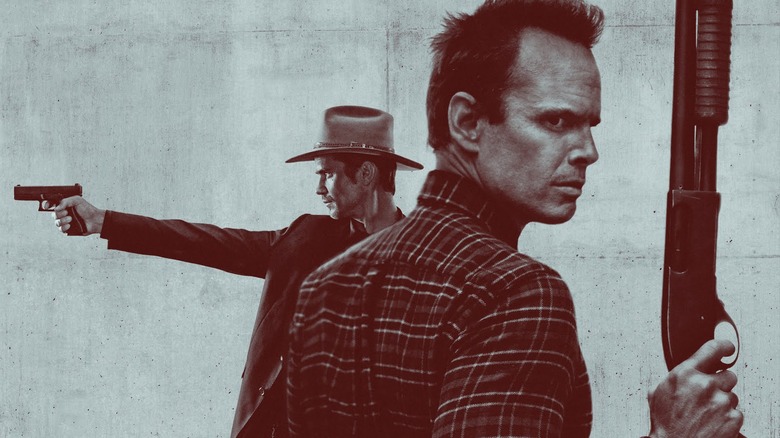
Deputy U.S. Marshal Raylan Givens represented a full-circle union for Elmore Leonard. Here was a hero that could've sauntered straight out of the Wild West pulp he wrote as a young man and into the paperback crime that later granted him immortality. In his debut appearance, the 1993 novel "Pronto," Givens cut a willfully anachronistic figure. Nobody took him seriously. Not the two-bit kidnappers or the retirement-minded bookies or even the women. Not at first, anyway. He was a kook with a six-shooter, completely at ease with his own myth and assured of his own accuracy.
He's an archetype borne of and destined for the screen, no matter which size. A TV movie adaptation of "Pronto," despite its considerable charms, did not impress the author. It took "Speed" screenwriter Graham Yost and the right foil to make the Marshal stick. "Fire in the Hole," the short story that became the "Justified" pilot, ends with the death of hometown boogeyman Boyd Crowder. But there was so much chemistry between him and Raylan, between leads Walton Goggins and Timothy Olyphant, that the producers made the fateful decision to resurrect him.
Six seasons, eight Emmy nominations, and one rubber stamp of approval from the author himself later, "Justified" stands tall as the ultimate Leonard adaptation starring the ultimate Leonard hero. To anyone still jonesing for a little Harlan County action and those who can't wait for the possible sequel series to develop, the following 14 TV shows should do the trick.
Karen Sisco
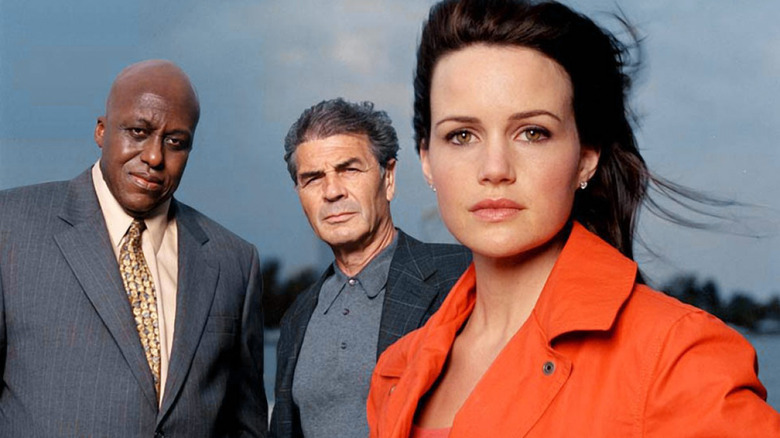
"Karen Sisco" is so good that "Justified" producers risked the legal fire and brimstone of The Walt Disney Company to make it canon. When Carla Gugino arrives in the third season, she's playing Karen Goodall, maiden name irrelevant. But half a glance at her resume -- still in the Marshals Service, still in Miami -- blows the cover. That's Sisco, alright, last seen on ABC almost a decade prior, seven episodes deep into a first season that never finished airing.
"Karen Sisco" was as anointed as any small-screen Leonard project could've been in 2003. "Get Shorty" and "Out of Sight" producer Danny DeVito and screenwriter Scott Frank watched from on high. Oscar-nominated "Jackie Brown" star Robert Forster steps in for Dennis Farina as Karen's loving-to-a-fault father. The pilot even adapts Leonard directly, specifically his first Sisco story, "Karen Makes Out." Network standards may have blunted the show's edge a little, but it had everything else going for it. Alas, that wasn't enough to make a dent in the Dick Wolf procedural complex. But "Karen Sisco" deserves reappraisal or at least a re-release, both as a missing link between the uber-cool '90s adaptations and the smaller, grittier business ahead, and a crackerjack hour in its own right; just dig that Isley Brothers song over the credits.
The Americans
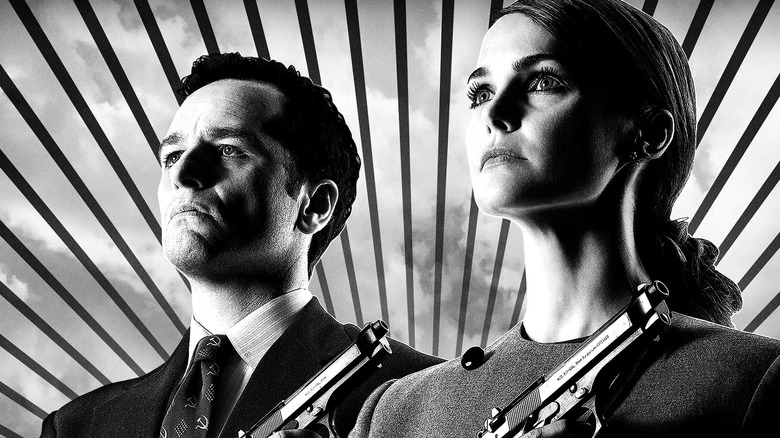
When the New York Times called the CIA to confirm the credentials of "Americans" creator Joe Weisberg for a story, they got the usual neither-confirm-nor-deny dance. Only after much prodding did they receive anything like an answer: "If he hadn't been in the CIA, we would somehow let you know." All they really needed to do was watch a couple episodes. That's proof enough.
Besides the oversight of executive producer Yost and an Emmy-winning turn by "Justified" veteran Margo Martindale, it doesn't have much in common with its country-western cousin. Pulp is a luxury Russian spies Matthew Rhys and Keri Russell can't afford. As red transplants living undercover as true-blue Americans, numb procedure keeps them alive and everyone else -- informants, their children, the FBI agent next door - in the dark. Suspense is a constantly held breath, from the opening foot chase irresistibly set to Fleetwood Mac's "Tusk" until the devastating finale. "The Americans" is not always a fun watch -- even Rhys's late-game passion for line dancing is stained with despair -- but it never wastes a second of Reaganomic dread.
The Shield
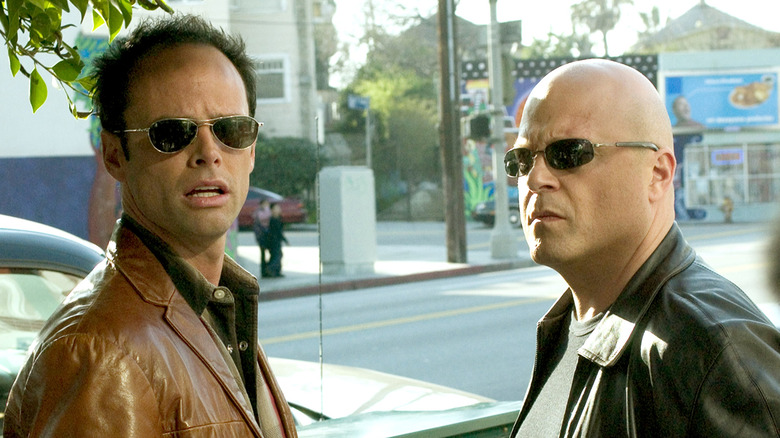
Norm Macdonald used to tell a story about his mom giggling at innuendo on a sitcom and subsequently recoiling when he filled in the blank, even though it all rhymed. What separated "The Shield" from an already-crowded pack of TV police on its 2002 premiere is filling in that blank. Loose cannons had been playing rough for a while, emphasis on "playing." At the end of the very first episode, bad cop Michael Chiklis executes a rookie in cold blood because he doesn't want to risk keeping a do-gooder around.
As the first scripted drama to win big on basic cable, "The Shield" changed television. More than a few shows on this list, including the very reason for this list, would not exist without it. Less profoundly though no less significant, it also brought Walton Goggins to the FX fold. For the first, but not last time, his character wasn't initially destined for the spotlight. Producers pushed him to the forefront of early scripts until the network saw the same thing they did. His resulting seven-season performance as Shane Vendrell remains a high-water mark for the genre.
Maximum Bob
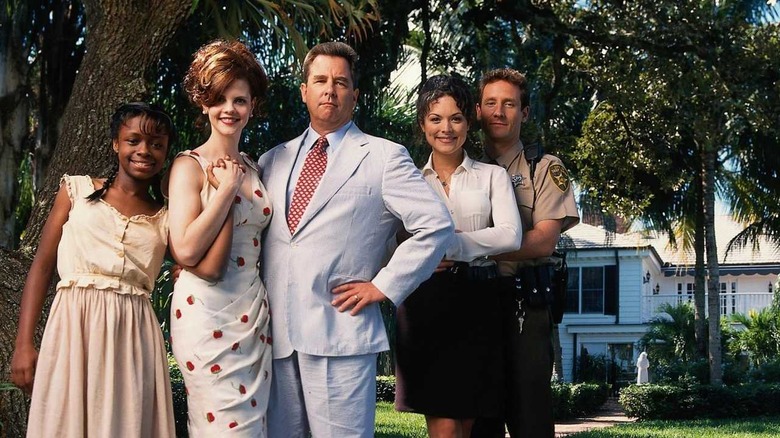
"Maximum Bob," Elmore Leonard's 29th novel, is a Leonard-brand yarn of Leonard-brand color. It's populated by high-powered frauds, lowlife scroungers, one self-styled cowboy (no relation), and a sprinkling of nuts. It's funnier than his average paperback, but only by an inch.
"Maximum Bob," the seven-episode series produced by "Get Shorty" director Barry Sonnenfeld, is a sitcom version of "Twin Peaks." When public defender Liz Vassey drives to Deepwater, Florida, she might as well be discovering an uncontacted tribe. Gleefully cruel, openly lecherous judge Beau Bridges works overtime as the de facto king and executioner of his swampy kingdom. His queen, former Weeki Wachee mermaid Kiersten Warren, speaks both for herself and the ghost of a dead slave girl. And that's, naturally, just the tip of this melting iceberg. The novel is dealt with in hour one, leaving the rest to cover Cuban revolutionaries lying in wait and local cryptids on the prowl. No close-up goes unwarped, no accent goes unfried.
By overcooking the Leonard recipe, "Maximum Bob" achieves a different flavor of watchability altogether. The novelist himself dubbed it "Hee Haw: The Movie" and, with all accounting for taste, he's not exactly wrong.
Get Shorty
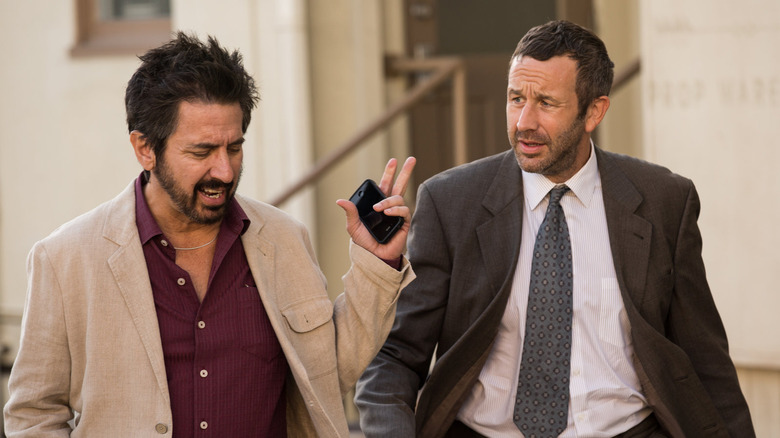
According to Dustin Hoffman, the titular shorty of "Get Shorty" is based on him. Elmore Leonard, who worked with the actor on a failed adaptation of "La Brava," denied these claims. The 2017 Epix series of the same name drops the shorty altogether, only keeping the word as an affectionate nickname, but preserves the print-the-legend absurdity that haunts his Hollywood story inside and out. What FX's "Fargo" is to the Coen brothers, this is to Elmore Leonard.
Names, demeanors have changed, but the dreams still linger just out of reach somewhere between naïve and delusional. Mafia ditch-digger Chris O'Dowd wants a career his daughter can look up to. After lucking across a debtor's screenplay, he seeks a similarly desperate partner in direct-to-video junk peddler Ray Romano. Together, they'll make a killing or die trying. Whereas the novel and the film both had the benefit of an ending, the series managed to find the resonant Leonard frequency and keep it vibrating across three seasons of constantly, clumsily escalating crime. Because of its pay-cable pedigree, "Get Shorty" never found the viewers it deserved live and hasn't yet won eternal life on streaming. Give it time -- Hollywood loves a comeback.
Fargo
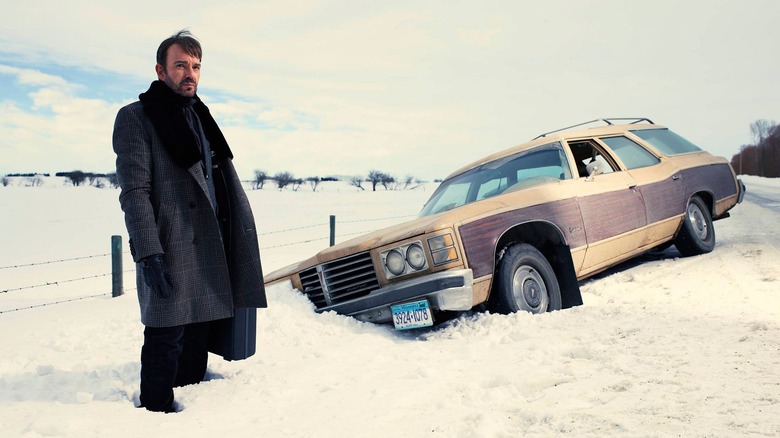
The most obvious reason to recommend "Fargo" is that Timothy Olyphant shows up in the fourth season as a Stetson-topped U.S. Marshal. But that's just a surface similarity, attractive as that surface may be. Those in the market for more unnervingly charismatic killers and small-town strivers blowing their best laid plans should look earlier, to the seasons that owe more to the Coen brothers, avowed Leonard fans both.
The inaugural season follows the unlikely union of wilting wallflower Martin Freeman and psychopathic assassin Billy Bob Thornton. The latter's just in town on business but in these parts, business is everyone's business. The first 10 episodes teeter between black comedy and just plain bleak, at their best when Thornton rattles off haunting lines like drive-thru orders. The second season broadens the scope and lets more light in, giving lawmen Patrick Wilson and Ted Danson more room to work and amateur killers Kirsten Dunst and Jesse Plemmons fewer places to hide. The welcome sprawl makes for one of the most quaintly cruel crime stories yet televised.
Bosch
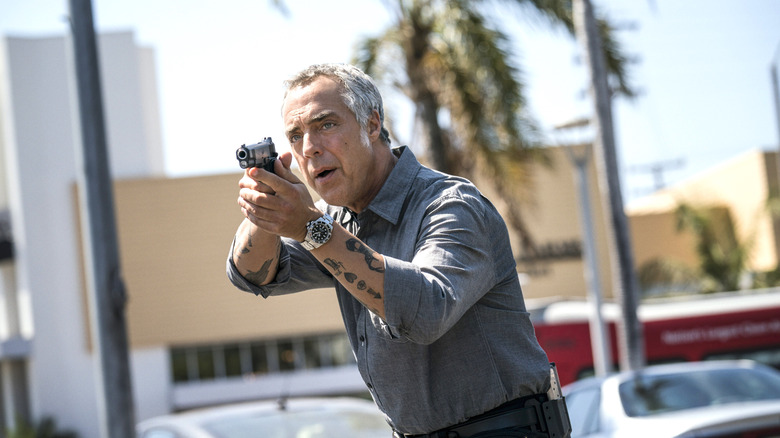
A hit crime drama based on a famous author's most famous creation, a lone-wolf law enforcer from a broken home who starts his own spiral with an illegal and ultimately lethal quickdraw, brought to life by a standout "Deadwood" alum -- "Bosch" or "Justified"?
It's both, though the similarities can be chalked up to genre convention and the powerhouse performances from their respective leading men. "He has a flawless moral compass," said Titus Welliver in a series post-mortem with Looper. It's an absolute that carries him through investigations like a monotone wrecking ball. When an arson-turned-homicide interrupts his New Year's Eve, he shrugs it off like any other shift: "Crime never sleeps."
As Amazon's watershed Original, "Bosch" endured and briefly achieved memedom because of that hellbent dependability. It didn't earn recaps from the usual suspects or many high-brow raves, but under that radar, found enough viewers to become the first hit procedural of the streaming age. There's a reason Michael Connelly's hard-boiled hero caught on with readers and viewers, and there's still time to find out for yourself before the spinoff comes to IMDb TV.
Deadwood
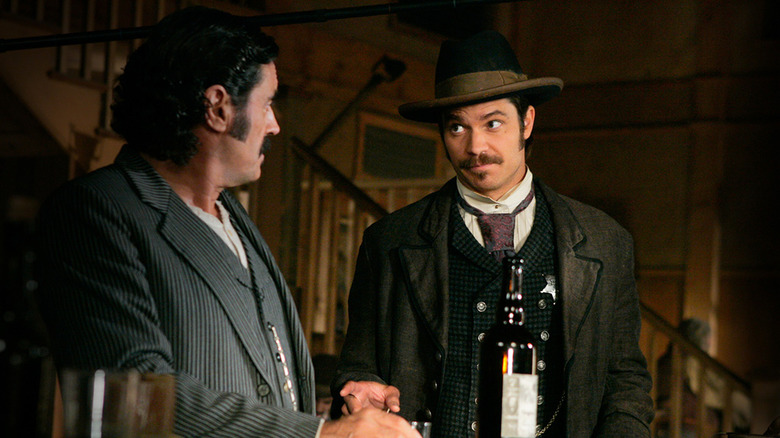
Recommending "Deadwood" on account of any serialized TV drama that came after is, with some exaggeration, like recommending Homer's "Odyssey" for any other written word. Alongside HBO contemporaries "The Sopranos" and "The Wire," David Milch's frontier epic laid down the law on the lack thereof. Language and violence, fresh corners of the televised canvas, were deployed not as cheap shock but time, place, and poetry. No more heroes, but anti-heroes and, even then, the label was generous. There were plenty in the powder-black heart of "Deadwood," but only two that kept it beating.
It'd be cheap and disingenuous to call reluctant sheriff Timothy Olyphant and saloon proprietor Ian McShane the local angel and devil; everybody's both in "Deadwood." But they are the anchors around each other's neck -- stuck, with the town pulled taut between them. McShane, already a proven force of nature, makes every four-letter word sound like his own patented invention. Olyphant, then shining in underwhelming film projects, is a revelation. The coiled-spring rage. The hip-holster swagger. The unmistakable sense that, however cool he comes off, it's not half as cool as he'd like to be. The Olyphant type arrived, fully formed, and influenced everything he'd do after. Without "Deadwood," he wouldn't land the Raylan Givens shortlist.
As is, it's obvious: He was born to wear the hat.
The Grinder
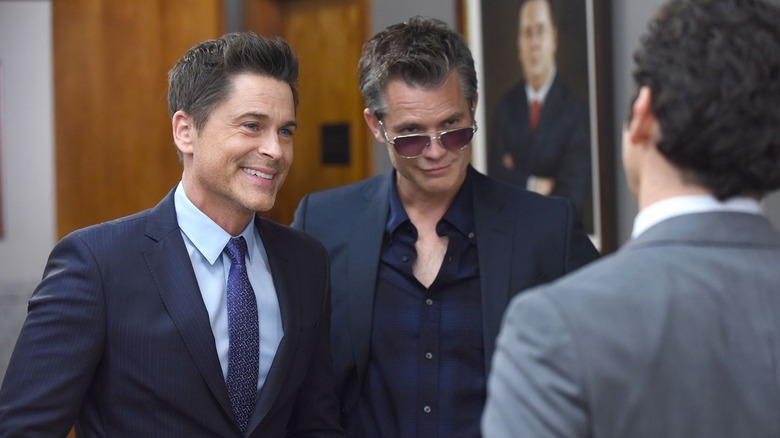
In a shake-up for this list, "The Grinder" is a comedy that got killed after one season despite critical acclaim. Rob Lowe plays an actor who famously played a lawyer, emphasis on the past-tense. Looking to center himself again, he moves back home to Idaho and decides his scripted experience is good enough to join the family law firm alongside brother Fred Savage and patriarch William Devane. Though his televised charm works better than expected, the rabbit hole goes both ways.
As Lowe finds his footing off-screen, a grim reaper comes for whatever's left of his on-screen legacy. That reaper? One Timothy Olyphant, playing a circus mirror reflection of himself. He punctuates surfer-dude philosophy with "bros" instead of periods, makes his dates watch his latest episodes, and looks for any excuse to flash abs on camera. He also happens to be starring in a New Orleans-set spin-off of Lowe's show and seducing the only woman Lowe can't. Olyphant doesn't often get to play boogeymen, and watching him do it as a giddy self-parody is a rare pleasure. He only haunts four episodes of 22, but the whole series is worth eulogizing.
Terriers
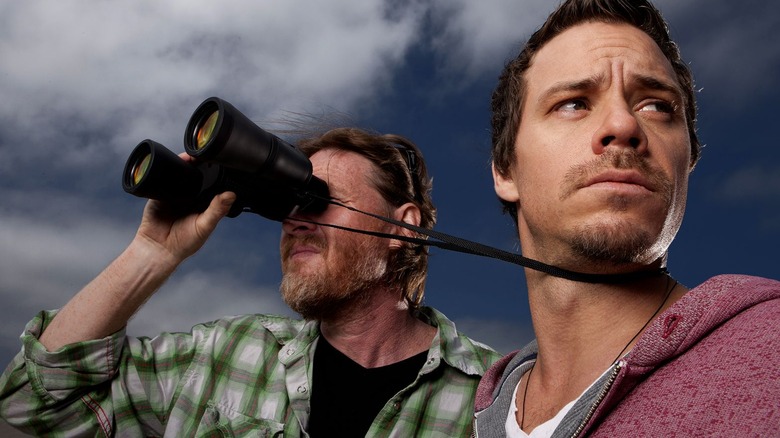
"Easiest 40K we ever made," says thief-turned-PI Michael Raymond-James to cop-turned-PI Donal Logue as he bounds up the ramp of an abandoned lifeguard hut, not realizing he's invoked wrath from the noir gods. They expect a young runaway. Instead, they find a dead and stinking John Doe. The pair flee the scene as far as the parking spot recently occupied by their towed-away pick-up. On their sunburned strata of the world, one more bounced check away from the bottom, insult always meets injury, it's only a question of how fast.
There's more than a little Chandler in Ted Griffin's "Terriers." Fallout from the Great Depression hung over Marlowe's Los Angeles like a mushroom cloud. The damage from the 2008 recession looks familiar, picturesque in spite of itself, but Logue and Raymond-James are still clawing their way out of ground zero, kidnapping as many lost dogs as it takes to pay the bills.
It's impossible to talk about "Terriers" without a hastily signed cross or whispered "rest in peace" somewhere nearby. Despite critical raves and as ravenous a cult following as any one-season wonder could have, the show pulled the lowest ratings of any FX show in the network's history. Only takes an episode to understand the mourning; it really was that good.
Raines
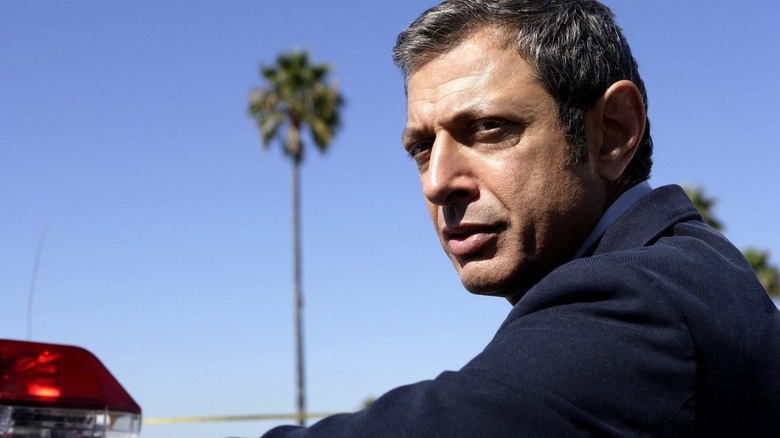
"Raines" belongs to that special breed of mid-2000s police procedural about snoops with deep-seated and professionally beneficial neuroses. Call it "Monk"-sploitation, a genre tailor-made to keep a dyed-in-the-wool eccentric like Jeff Goldblum gainfully employed.
His titular detective sees dead people ... or, at least, his Sherlocked impression of them. The more he knows and notices, the more accurate they become. Dead partner Malik Yoba, for all intents and purposes, survives in his own head. Then again, a manifested prostitute chastises him for imagining such a stereotypically revealing outfit. So is the cop really playing pretend or picking up some arcane signal?
"I didn't want to belabor the whole thing and try to spend all that time in the pilot setting up how this was happening," said creator Graham Yost. Alas, there wouldn't be much more time to spend. "Raines" only lasted seven episodes, despite Goldblum doing his best Marlowe and Frank Darabont directing the pilot. A shame then and now -- there were a lot more dead people worth seeing.
Trust
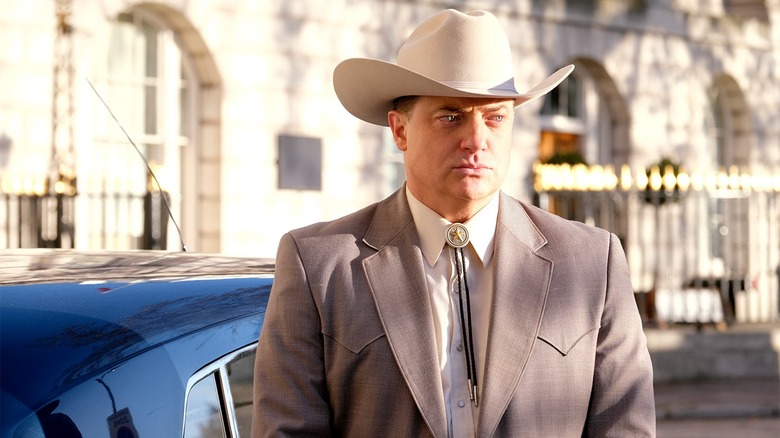
"The rich are not like us," says Getty family fixer Brendan Fraser in the shade of a good-guy Stetson. He explains the difference with a war story, about a squadmate knocking friendlies off an overloaded chopper without hesitation or remorse. The lesson confounds his listener, but the audience has plenty of time to connect the dots. He is, as Fraser described him, the Greek chorus, the Have-Not among the Haves who defines the difference sometimes in soliloquy and sometimes just by occupying the same lavish space.
As dissected in Simon Beaufoy's "Trust," the Gettys are not a family unit but crystallized greed. Legendary oil tycoon patriarch Donald Sutherland is terminally soul-sick, too long insulated from the human condition. His offspring will take any amount of abuse just to stay close to the vault. No compassion left, only self-destructive tolerance and a folksy Texan tour guide to swagger through it. Even if you know the story, director Danny Boyle's glitzy flourishes and Fraser's gold-plated return to the spotlight make its lone season a worthwhile investment.
Boomtown
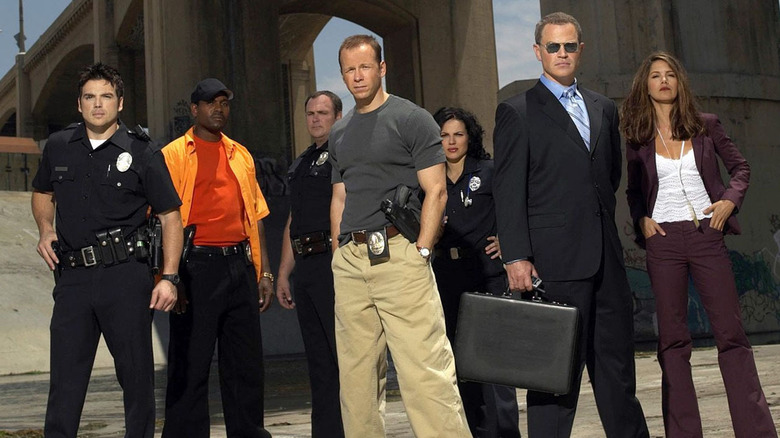
The first time Graham Yost followed Akira Kurosawa's lead, the latter's script for "Runaway Train" became the basis for "Speed." The second time, he turned "Rashomon" into this NBC procedural about crimes witnessed by every possible angle, police and perpetrator, victim and bystander. But unlike its inspiration, there was no editorializing among accounts -- the perspective was the thing. In 45 minutes, all eyes added up to a complete story, not necessarily of law or order, but the emotional mooring of every tarnished soul in orbit.
The result is a more empathetic game of cops and robbers. The pilot opens on a tone-poem monologue to camera about the L.A. River's barrenness. Only in the closing scene is it revealed and recontextualized as the eulogy of a mourning man who can't quite bring himself to spill ashes over the side. Even the most dubious characters -- future "Justified" alum Neal McDonough is all ice as a careering DA -- are understood.
But the novel structure wasn't enough to beat bad ratings and network notes. The show made it two episodes into a second season before NBC pulled the plug. In an interview with AV Club a decade after its cancellation, Yost provided a sad, savvy eulogy: "'Boomtown' was perhaps, in retrospect, better suited for HBO or FX."
Thief
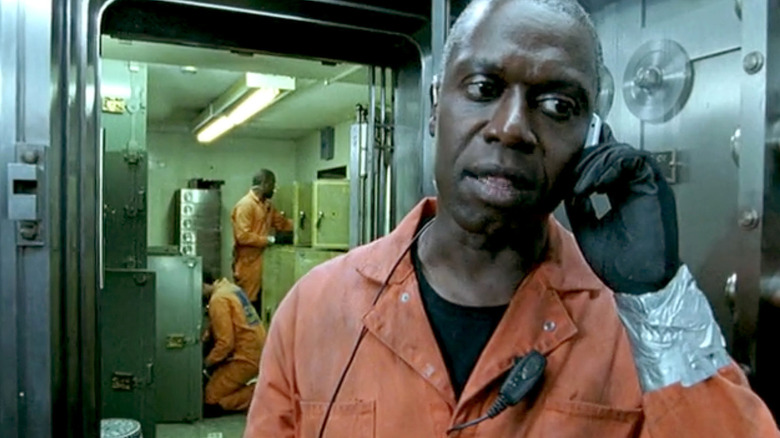
Unlike "Terriers," there are few roses on the FX-branded headstone of "Thief." Aired in the early dawn light before "Damages" and "Sons of Anarchy," it lasted only six episodes and endures, ironically, as a blueprint of the original programming to come. Master thief Andre Braugher's terminal work-life balance, ripping off U.S. Treasury planes by night and raising estranged stepdaughter Mae Whitman by day, presages "The Americans." The relationship between Braugher and dirty cop Michael Rooker, though mostly by off-screen reputation, flirts with Raylan and Boyd's mutually demented respect. And, as with all of the network's home runs, the marquee performance is worth its weight in gold statues.
Braugher is, as Braugher always is, phenomenal. His stone-still facade, later deployed to lethal comic effect in "Brooklyn Nine-Nine," doubles as his resume here. Every gesture, every blink is deliberate and safe-cracker calm. But all it takes is a close-up to see all the moving pieces, some literal, behind his bulldog eyes. Forget the spinning dials and fenced diamonds -- that's where the real action is.
Read this next: Shows Like Breaking Bad That You Can Binge Watch Today
The post 14 Shows Like Justified That Are Definitely Worth Watching appeared first on /Film.
from /Film https://ift.tt/3q1qTH7
